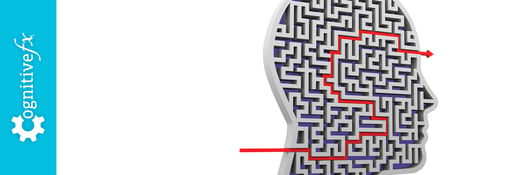Post-Concussion Syndrome & Medications for Mental Health
Concussions may be the hardest form of traumatic brain injury to treat due to the convoluted nature of long-term symptoms and how those symptoms can be misdiagnosed or even undiagnosed.
Published peer-reviewed research shows that Cognitive FX treatment leads to meaningful symptom reduction in post-concussion symptoms for 77% of study participants. Cognitive FX is the only PCS clinic with third-party validated treatment outcomes.
READ FULL STUDY
If you're reading this, you or someone you love may have experienced what doctors call a "mini-stroke" or TIA (transient ischemic attack). Perhaps your doctor told you that you were lucky—that the symptoms resolved, the crisis passed, and everything should return to normal. Yet here you are, weeks or even months later, struggling with memory lapses, difficulty concentrating, or a persistent mental fog that wasn't there before.
You're not imagining it. And you're not alone.
While the medical community has traditionally viewed TIAs as temporary warning events with no lasting damage, emerging research tells a different story. Studies show that approximately 85% of patients with suspected mild ischemic stroke or TIA demonstrate cognitive abnormalities within 24 hours of onset PubMed Central, and many TIA survivors experience genuine cognitive difficulties that can significantly impact their daily lives, work performance, and overall quality of life.
This comprehensive guide will help you understand why a supposedly "transient" event can lead to lasting problems with memory, focus, and mental clarity—and, most importantly, what advanced diagnostic tools and treatment options are available to help you recover.
A transient ischemic attack occurs when blood flow to part of your brain is temporarily blocked, typically by a blood clot. Unlike a full stroke, the blockage resolves quickly—usually within minutes to hours—and symptoms disappear. The traditional definition emphasizes that TIAs cause no permanent brain damage, which is why they're often called "mini-strokes."
However, modern brain imaging technology has revealed a more complex reality. Studies using MRI scans have shown that approximately 30-50% of patients diagnosed with TIA actually have evidence of acute brain injury, challenging the notion that these events are truly "transient" without consequence.
Even when a TIA doesn't cause visible damage on standard imaging, the event triggers several processes that can affect brain function:
Neurovascular Coupling Dysfunction: One of the most significant yet overlooked impacts of a TIA is disruption to neurovascular coupling (NVC)—the brain's ability to match blood flow with neural activity. When you're thinking, reading, or problem-solving, your brain increases blood flow to the regions working hardest. After a TIA, this coordination can become impaired, leading to the sensation that your brain isn't getting the fuel it needs to function properly.
Microstructural Brain Changes: Research has demonstrated that TIAs can cause subtle changes in white matter—the brain's wiring system that connects different regions. These microscopic alterations may not show up on standard imaging but can affect how quickly and efficiently your brain processes information.
Inflammatory Response: When brain tissue experiences even temporary oxygen deprivation, it triggers an inflammatory cascade. This inflammation can persist beyond the acute event, potentially interfering with normal cognitive function for weeks or months afterward.
Communication Breakdown Between Brain Regions: Beyond damage to individual brain areas, TIAs can disrupt how different regions communicate with each other. Your brain functions like an orchestra—when the musicians can't hear each other properly, the entire performance suffers, even if each individual musician is technically capable.
Vascular Risk Factors: The same underlying conditions that caused your TIA—such as high blood pressure, diabetes, or atherosclerosis—continue to affect blood flow to your brain, creating an environment where cognitive function may decline over time.
Psychological Impact: The emotional stress of experiencing a TIA, combined with anxiety about future strokes, can also contribute to difficulties with concentration and memory. This isn't "all in your head"—stress hormones have real, measurable effects on brain function.
Understanding what's normal after a mini-stroke can help you recognize when you need additional support. Here are the most frequently reported cognitive symptoms:
Many TIA survivors report problems with short-term memory. You might find yourself:
Studies have found that memory problems are among the most common complaints after TIA, affecting anywhere from 20-50% of patients in the months following the event.
Perhaps the most frustrating symptom is what patients describe as "brain fog"—a persistent feeling of mental cloudiness. This manifests as:
This cognitive fatigue can be particularly debilitating because it's invisible to others and difficult to quantify, yet profoundly affects your daily functioning. The underlying cause often relates to inefficient neurovascular coupling—your brain is working much harder than it should to accomplish basic tasks, leading to rapid mental exhaustion.
After a TIA, many people find it harder to:
These attention difficulties can make returning to work particularly challenging, especially in jobs requiring sustained concentration or juggling multiple responsibilities.
Executive functions are the high-level cognitive skills that help you plan, organize, and complete tasks. Post-TIA executive function problems might include:
Some TIA survivors notice subtle changes in their ability to:
https://www.ahajournals.org/doi/10.1161/STROKEAHA.124.046821?doi=10.1161/STROKEAHA.124.046821
This is one of the most common questions patients ask their doctors, and the answer deserves nuance: Yes, cognitive changes after a TIA are more common than many people realize, but they shouldn't be dismissed as inevitable or untreatable.
Research indicates that cognitive impairment occurs in approximately 40-60% of TIA and minor stroke patients, with studies showing that 48.84% of patients had post-stroke cognitive impairment at baseline assessment BioMed Central. A significant longitudinal study found that individuals who experience a TIA have an increased risk of developing cognitive decline and dementia compared to those who haven't had a cerebrovascular event.
However, "normal" doesn't mean "acceptable" or "something you just have to live with." The presence of cognitive symptoms after a TIA should prompt:

Higher working memory-related activation (2-back task) in the right inferior frontal gyrus (IFG) in patients than controls at one week (A) and three months (B) after TIA. The patients with TIA exhibited significant over-activation of the IFG during the 2-back condition, but not during the 0-back condition, at both 1 week and 3 months. https://pmc.ncbi.nlm.nih.gov/articles/PMC6246834/
One of the most frustrating experiences for TIA survivors is being told "everything looks fine" on standard MRI or CT scans, despite experiencing significant cognitive problems. This disconnect happens because traditional imaging only shows structural damage—it reveals whether brain tissue has died, but not whether your brain is functioning efficiently.
Think of it this way: a standard MRI is like taking a photograph of your car's engine. It can show if parts are broken or missing, but it can't tell you if the engine is running smoothly, burning fuel efficiently, or if the timing is off. Similarly, traditional brain imaging can miss functional problems—issues with how your brain regions communicate and coordinate their activity.
This is where functional imaging becomes crucial for understanding and treating post-TIA cognitive problems.
Functional NeuroCognitive Imaging (fNCI) is a specialized brain imaging scan that measures blood flow patterns in approximately 60 different brain regions while you perform cognitive tasks Cognitive FX. Unlike traditional imaging that only shows structure, fNCI reveals function—how efficiently different parts of your brain are working and communicating with each other.
During an fNCI scan, you complete standardized cognitive tasks while the scanner measures blood flow throughout your brain. This creates a detailed map showing:
While a standard MRI might show that your brain tissue appears normal after a TIA, an fNCI scan can reveal the underlying dysfunction causing your symptoms. The comparison images show a striking difference:
In a healthy brain: Blood flow is balanced, with appropriate activation in response to tasks and efficient communication between regions.
After a TIA or brain injury: You might see areas of abnormal activation (shown in red and yellow on scans), indicating poor neurovascular coupling—the regions aren't getting adequate blood flow when they're working, or they're having to work much harder than normal to complete tasks.
This objective visualization accomplishes something powerful: it validates your experience. You're not crazy, you're not being dramatic—there's a measurable, visible reason why you're struggling.
Many TIA patients feel abandoned after their initial treatment, experiencing a lack of communication, follow-up, rehabilitation options, and personalized support Cognitive FX. The typical approach focuses primarily on preventing another stroke through medication and lifestyle changes, but rarely addresses the ongoing cognitive symptoms that can persist for months or years.
Standard treatment usually includes:
While stroke prevention is absolutely critical, this approach leaves many patients struggling with unresolved cognitive difficulties that significantly impact their quality of life. Isolated therapy appointments—a speech therapy session one week, a physical therapy appointment the next—often fail to produce meaningful improvement because they don't address the brain's need for intensive, coordinated rehabilitation.
At Cognitive FX, treatment begins with a comprehensive fNCI scan to determine exactly how and where the TIA affected brain function Cognitive FX. This detailed functional map becomes the foundation for creating a personalized treatment plan targeting your specific areas of dysfunction.
The Comprehensive Treatment Program Includes:
1. One-to-Two Week Intensive Treatment Protocol Rather than scattered appointments over months, treatment is delivered in an intensive format—6 to 8 hours per day for one to two weeks. This intensive approach is critical because the brain requires consistent, repeated stimulation to form new neural pathways and restore healthy function.
2. Multidisciplinary Team Approach Your treatment is delivered by a team of over 35 different doctors, therapists, and technicians using over 20 medical treatment devices cognitivefxusa. This team may include:
3. Targeted Therapy Based on Your Brain Scan Every treatment session is designed based on your individual fNCI results. If your scan shows that certain regions involved in memory are underactivating, your therapies will specifically target activation of those areas. If you have dysregulation in the autonomic nervous system contributing to fatigue, treatment addresses that dysfunction directly.
4. The Prepare-Activate-Recovery Protocol Treatment follows a strategic sequence:
Prepare: Sessions begin with activities that increase cerebral blood flow and create neurochemicals (like BDNF, dopamine, and acetylcholine) that promote brain plasticity and neurogenesis—the brain's ability to form new connections and even generate new neurons.
Activate: This is the core treatment phase, highly individualized based on your fNCI results. You might receive:
Recovery: Strategic rest periods allow your brain to consolidate the changes being made during activation sessions, similar to how muscles grow stronger during rest after exercise.
The treatment week is intensive and demanding—but you're supported every step of the way by a team that understands what you're going through. Many patients notice improvements within the first few days:
These improvements aren't just subjective feelings—they're verified through follow-up fNCI scans at the end of treatment, providing objective evidence of functional brain changes.
The effectiveness of this approach isn't just anecdotal. Published peer-reviewed research shows that Cognitive FX treatment leads to meaningful symptom reduction for 77% of study participants, with 77% reporting a return to normal cognitive baseline testing and 94% reporting a reduction in symptoms cognitivefxusa.
Additionally, 85% of patients treated report improvement in brain fog and fatigue symptoms between treatment and six-month follow-up cognitivefxusa. Cognitive FX is the only post-concussion and brain injury clinic with independently validated, third-party research confirming treatment outcomes.
Importantly, 95% of patients experience statistically verified restoration of brain function after treatment Cognitive FX, with the average patient being over 4 years post-injury at the time of treatment—proving that recovery is possible even years after a TIA.
If you're experiencing cognitive difficulties after a TIA, taking action early can make a significant difference in your recovery trajectory.
While some initial recovery may occur in the first weeks after a TIA, if you're still experiencing significant symptoms at 3-6 months, it's unlikely they'll resolve without intervention. Don't wait years hoping things will improve on their own—research shows that without proper treatment, cognitive difficulties often persist or worsen.
Standard neurological exams and imaging may not reveal the source of your cognitive problems. Consider seeking evaluation at a specialized clinic that offers:
Keep a symptom journal before your appointment, noting:
Aggressive management of the conditions that contributed to your TIA is crucial for preventing further cognitive decline. Work with your healthcare team to:
Research consistently shows that controlling these risk factors not only reduces stroke risk but can also improve cognitive outcomes.
Review all your medications with your doctor to ensure you're on appropriate preventive therapy, which typically includes:
Also discuss any medications that might be contributing to cognitive symptoms, as some drugs can worsen memory or concentration problems.
If traditional post-TIA care hasn't resolved your cognitive symptoms, consider evaluation at a clinic specializing in functional brain recovery. Look for programs that offer:
Sleep problems and emotional distress are common after TIA and can significantly worsen cognitive symptoms. Talk to your doctor about:
While specialized treatment is essential, your daily habits and environment play a crucial role in cognitive recovery and maintaining improvements:
Physical Exercise: Aerobic exercise has proven benefits for brain health and cognitive function. Studies show that regular moderate exercise can improve memory, processing speed, and executive function in people who've had cerebrovascular events. Aim for at least 150 minutes of moderate-intensity activity per week, with your doctor's approval.
Brain-Healthy Diet: The Mediterranean or MIND diet, rich in vegetables, fruits, whole grains, fish, and healthy fats, has been associated with better cognitive outcomes and reduced stroke risk. These dietary patterns support vascular health and provide anti-inflammatory benefits.
Continued Cognitive Exercise: Following intensive treatment, maintaining your cognitive improvements requires ongoing engagement. This might include home exercise programs provided by your treatment team, apps designed for cognitive training, or engaging in mentally stimulating activities like learning new skills.
Social Engagement: Maintaining social connections and engaging in mentally stimulating activities helps build cognitive reserve—your brain's resilience against damage. Join groups, maintain hobbies, and stay connected with friends and family.
Stress Reduction: Chronic stress impairs cognitive function and increases stroke risk. Explore stress management techniques such as meditation, yoga, deep breathing exercises, or other relaxation practices that work for you.
While this guide focuses on the more gradual cognitive changes after TIA, you should seek emergency care immediately if you experience:
Remember, having had one TIA increases your risk for future strokes, and prompt treatment is critical.
Recovering from a TIA and addressing cognitive problems requires a healthcare partner who:
When choosing a clinic or healthcare provider for post-TIA cognitive rehabilitation, look for:
Questions to Ask When Evaluating Treatment Options:
While every patient's journey is unique, the common thread in successful recovery stories is finding the right diagnosis and treatment approach:
One patient shared: "Cognitive FX gave our daughter her life back! The therapists are so attentive, skilled, caring and fun. Dr. Fong and RN Kaydee Severs are so incredibly smart, thorough in their explanations and exceptionally compassionate."
Another noted: "Everyone was super nice and encouraging. The therapies were tailored to my individual strengths, weaknesses, and needs. I have had significant improvement and my last FMRI came back looking significantly better than the first one. I feel like I am getting back to my old self after nearly 5 years of problems and pain."
Perhaps most telling is this testimonial: "This place saved the life of someone we love. I was so impressed with the level of professionalism and care that we received."
These aren't isolated experiences—they reflect the transformative potential of proper diagnosis and intensive, targeted treatment for post-TIA cognitive problems.
Here's an important message that often gets lost in discussions about post-TIA cognitive problems: recovery is possible, even years after your TIA.
The brain possesses remarkable neuroplasticity—the ability to form new neural connections, reroute communication pathways, and restore function even after injury. With the right diagnostic tools to identify where your brain is struggling, and the right intensive treatment to promote neuroplastic change, significant improvement is achievable.
Recovery timelines vary, but many people experience substantial improvement in cognitive function when they engage actively in proper rehabilitation that targets their specific areas of dysfunction. Even for those with persistent difficulties that don't fully resolve, dramatic improvements in quality of life and functional independence are often achievable.
The key is accurate diagnosis of what's actually wrong with your brain function, followed by intensive, coordinated treatment that addresses those specific problems.
Figure 1 Assessment of Focal Hypoperfusion Within and Outside the Expected TIA Territory on Baseline Perfusion-Weighted Imaging MRI -https://www.neurology.org/doi/10.1212/WNL.0000000000213930
The cognitive problems you're experiencing after your TIA are real, they're measurable with the right diagnostic tools, and they're treatable with the right approach. You're not being overly sensitive or anxious—you're accurately perceiving changes in your brain function that research confirms are common after these events.
While the term "mini-stroke" might minimize the experience, the impact on your life can be anything but minor. The gap between traditional post-TIA care (which focuses primarily on preventing future strokes) and what many patients actually need (treatment for ongoing cognitive symptoms) leaves too many people suffering unnecessarily.
By understanding what's happening in your brain, seeking appropriate functional evaluation, and pursuing intensive rehabilitation when needed, you can optimize your cognitive health and reduce your risk of future events. Modern neuroscience has given us both the diagnostic tools to see what's wrong and the treatment approaches to fix it—you just need to find providers who use them.
Remember: experiencing a TIA was a wake-up call, but it was also an opportunity—a chance to take control of your brain health, make meaningful changes, and potentially recover function you thought was permanently lost.
If you're struggling with cognitive problems months or years after a TIA, don't accept "this is just how it is now" as your final answer. The science, the technology, and the treatment protocols exist to help you recover. Your next step is finding the right team to help you get there.
Take the Next Step:
If you're experiencing persistent cognitive problems after a TIA and standard treatment hasn't helped, consider scheduling a consultation with Cognitive FX to learn whether functional brain imaging and intensive treatment can help you recover.
This article is for informational purposes only and should not replace personalized medical advice. Always consult with qualified healthcare providers about your specific situation and treatment options.
This article draws on current medical research and clinical guidelines, including:
Cognitive Outcomes After TIA:
Treatment and Recovery:
Additional Research:
For specific medical guidance regarding your individual situation, please consult with qualified healthcare providers who specialize in cerebrovascular disease and brain injury rehabilitation.

Alina Fong, Ph.D. is a clinical neuropsychologist and the Clinical Director and Co-Founder of Cognitive FX. She earned her Ph.D. in Clinical Neuropsychology with an emphasis in Neuroimaging from Brigham Young University, where she received the American Psychological Association Division 40 Graduate Student Research Award for her neuroimaging research. Dr. Fong has over 17 years of clinical experience treating traumatic brain injury, beginning with her work at the VA Salt Lake City Healthcare System and Utah Valley Regional Medical Center, where she directed the neurotrauma rehabilitation and sports concussion clinics. She developed the EPIC Treatment protocol and has personally overseen treatment for nearly 8,000 brain injury patients, including professional athletes from the NFL, NHL, and Olympics. She serves as Vice President of the Brain Injury Alliance of Utah, sits on the board of the United States Brain Injury Alliance, and advises PINK Concussions. Dr. Fong has authored peer-reviewed research on functional MRI and concussion treatment and has presented at over 60 medical conferences, including the Federal Interagency Conference on TBI and the American Medical Society for Sports Medicine.

Concussions may be the hardest form of traumatic brain injury to treat due to the convoluted nature of long-term symptoms and how those symptoms can be misdiagnosed or even undiagnosed.

A concussion is defined as “the result of the forceful motion of the head or impact causing a brief change in mental status (confusion, disorientation, or memory loss), with or without a loss of...

I meet with patients every single day who have been dealing with concussion symptoms. Sometimes they have been experiencing them for a short amount of time, and others have been dealing with them for...

You've done everything your doctor told you to do. You rested in a dark room for weeks. You took the medications. You went to physical therapy. You've seen three different neurologists. Your CT scan...

Neurologists and Neuropsychologists often get mistaken as one and the same. Although there are some similarities, the differences...

Leg weakness after a concussion can significantly impact mobility and daily life. Patients may feel their legs are untrustworthy, worry about falling, or contend with stiffness and fatigue.
Published peer-reviewed research shows that Cognitive FX treatment leads to meaningful symptom reduction in post-concussion symptoms for 77% of study participants. Cognitive FX is the only PCS clinic with third-party validated treatment outcomes.
READ FULL STUDY